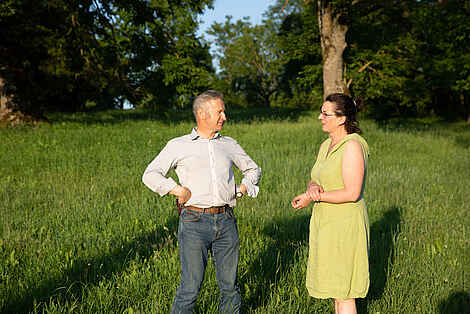News
Family farm Martinelis in Lithuania
The Martinelis biodynamic family farm near Vilnius in Lithuania lies amidst lush green countryside. Despite the growing numbers of biodynamic farms, the method is still new in this country. After Arunas Martinelis' grandmother signed over the first 10 hectares to him, they have been in ongoing conversion from conventional agriculture since 2012.
The Martinelis biodynamic family farm near Vilnius in Lithuania lies amidst lush green countryside. Storks stride across newly cut fields and the Highland cattle seek out shade in an area of woodland close to their meadow.
Lithuania is a country with clearly marked seasons, natural landscapes and a unique history, but also large areas of monocultures with "chemical farming", as Rasa Ciriene, president of Lithuania's biodynamic association, calls it.
Despite the growing numbers of biodynamic farms, the method is still new in this country. After Arunas Martinelis' grandmother signed over the first 10 hectares to him, they have been in ongoing conversion from conventional agriculture since 2012. Talking about conventional agrochemicals, Arunas now says, "I didn't see a future with them. I had the feeling that these fertilisers and pesticides were putting my health and that of the soil at risk."
So he first converted to organic farming. But even then he felt that something was lacking. It was only when he switched to biodynamic agriculture in 2017 that he found what he had been looking for. Integrating animals on the farm, the farm individuality and working in accordance with Maria Thun's calendar became particularly important.
For Arunas, biodynamic agriculture also recalls the forgotten traditions of his country. In earlier times, cattle were combined with cereal growing to produce good compost. And in the past the different seasons and phases of the moon were also given greater attention for planting, care and storage on the farm.
The farm is now one of the absolute pioneers in Lithuania to make use of these farming methods. With an acreage of 500 hectares and 140 head of cattle, they produce mainly meat and cereals (buckwheat, oats, spelt and wheat). In addition, the diverse garden produces essential oils and distillates. Arunas does not view the occasionally lower yields as a problem. He has concentrated on special types of cereals, such as gluten-free oats, and can sell these more reliably and for better returns.
The Martinelis family plan to continue to support chemical-free farming and biodynamic training in their country. Kristina Martinelis is convinced that "we are dependent on our plants and animals as they are on us. It is our duty as human beings and as a family to protect our earth and the plants and animals."
